also The Eve of Jesus' Name
 On this day, we prepare to celebrate the name chosen by God for His dear Son, who came in the flesh to save His people from their sins. It is also a time to take stock of our lives, ponder our brief time spent on earth, and prepare for eternity with God through faith in Jesus Christ.
On this day, we prepare to celebrate the name chosen by God for His dear Son, who came in the flesh to save His people from their sins. It is also a time to take stock of our lives, ponder our brief time spent on earth, and prepare for eternity with God through faith in Jesus Christ.Lection
Psalm 90:1-12
Isaiah 30:(8-14) 15-17
Romans 8:31b-39
Luke 12:35-40
Collects
Eternal God, we commit to Your mercy and forgiveness the year now ending and commend to Your blessing and love the times yet to come. In the new year, abide among us with Your Holy Spirit that we may always trust in the saving name of our Lord Jesus Christ, who lives and reigns with You and the Holy Spirit, one God, now and forever.
Lord God, heavenly Father, because You sent us Your only-begotten Son for our salvation and gave Him the name of Jesus, grant that we may begin the New Year trusting in His saving name and live all our days in His service and praise to the glory of His holy name; who lives and reigns with You and the Holy Spirit, one God, now and forever.
Labels: eternity, future, jesus, name, new year, past, present, reflection, time
 David, son of Jesse, went from tending his father's flocks to being the greatest of Israel's kings. He ruled from about 1010 to 970 B.C. He was chosen by the Lord and anointed by Samuel to replace the apostate King Saul, for whom David had provided years of faithful service. The events of his life are found from 1 Samuel 16 through 1 Kings 2 and in 1 Chronicles 10 through chapter 29. David's son Solomon succeeded him as king.
David, son of Jesse, went from tending his father's flocks to being the greatest of Israel's kings. He ruled from about 1010 to 970 B.C. He was chosen by the Lord and anointed by Samuel to replace the apostate King Saul, for whom David had provided years of faithful service. The events of his life are found from 1 Samuel 16 through 1 Kings 2 and in 1 Chronicles 10 through chapter 29. David's son Solomon succeeded him as king.David was also gifted musically. Skilled in playing the lyre, he wrote at least seventy-three of the Psalms, including the beloved Psalm 23 and several Messianic prophecies, including the foreshadowing of Christ's crucifixion in Psalm 22.
David's public and private character displayed a mixture of good, for example, his defeat of the giant Goliath, (1 Samuel 17) and evil, as in his adultery with Bathsheba, Uriah's wife, followed by his murder of Uriah, (2 Samuel 11). David's greatness lay in his fierce loyalty to God as Israel's military and political leader. For example, under his leadership, the people of Israel were united into a single nation with Jerusalem as the capital city.
This devotion to the Lord and to the people was coupled with his willingness to acknowledge his sins and ask for God's forgiveness, as recorded in 2 Samuel 12.* The great penitential outpouring of Psalm 51** came as a result of his sins against Uriah, as did the thoughts and emotions expressed in Psalm 32.
David's standing before the Lord and his place in the Messianic line are mentioned in many places. Of all of these, Paul's words in Acts 13:22-23 provide a fitting summary: "[The Lord] raised up David to be their king, of whom he testified and said, 'I have found in David the son of Jesse a man after my heart, who will do all my will.' Of this man's offspring God has brought to Israel a Savior, Jesus, as he promised."
*You Da Man! — a sermon on 2 Samuel 12
**Mercy Me! — a sermon on Psalm 51
Labels: biography, christology, commemoration, david, goliath, hagiography, israel, jesus, king, old testament, psalms
 This day commemorates the slaughter of Bethlehem's children by Herod the Great (Matthew 2:16-18), as he attempted to destroy the Usurper to his throne.
This day commemorates the slaughter of Bethlehem's children by Herod the Great (Matthew 2:16-18), as he attempted to destroy the Usurper to his throne.Herod, his jealousy inflamed by the account given by the Wise Men (Matthew 2:7), sent his soldiers to kill all the town's boys two years old and younger in order to protect his throne and lineage. This was one of the last major decisions made in a life filled with vainglory and increasing insanity. His plan went awry, since the Lord sent an angel to warn Joseph, who led Jesus and Mary to safety in Egypt, where they stayed until the tyrant's death.
 The commemorations of Stephen, John, and the Innocents remind us that not all receive the Gift of Christmas with joy. However, God's plan of salvation spreads in spite of hatred. Even today, much of the world actively rejects the Gospel and persecutes those who preach and live it.
The commemorations of Stephen, John, and the Innocents remind us that not all receive the Gift of Christmas with joy. However, God's plan of salvation spreads in spite of hatred. Even today, much of the world actively rejects the Gospel and persecutes those who preach and live it.Yet through all the years, the Church has continued to proclaim Christ — Christ incarnate, Christ crucified, Christ resurrected, Christ ascended, Christ returning. The very resistance of the Devil, the hard-hearts of others, and the testimony of our own sinful natures all provide ample evidence of the world's desperate need for His forgiveness. God grant that we faithfully believe and steadfastly confess this saving message, the Good News of forgiveness of sins in Christ Jesus.
Lection
Psalm 54
Jeremiah 31:15-17
Revelation 14:1-5
Matthew 2:13-18
Collect
Almighty God, the martyred innocents of Bethlehem showed forth Your praise not by speaking but by dying. Put to death in us all that is in conflict with Your will that our lives may bear witness to the faith we profess with our lips; through Lord Jesus, our Christ, who lives and reigns with You and the Holy Spirit, one God, now and forever.
Labels: bethlehem, christmas, feasts, festivals, gospels, herod, holy innocents, jesus, magi, martyrdom, new testament, wise men
 Saint John, Apostle and Evangelist, a son of Zebedee, was one of the twelve apostles. With his brother James and Simon Peter, he formed an inner circle among the Twelve: Those three beheld the Great Catch of Fish (Luke 5:10), the healing of Peter's mother-in-law (Mark 1:29-31), the raising of Jairus' daughter(Mark 5:37; Luke 8:51), the Transfiguration (Matthew 17:1; Mark 9:2; Luke 9:28), and Gethsemane's agony (Matthew 26:37; Mark 14:33).
Saint John, Apostle and Evangelist, a son of Zebedee, was one of the twelve apostles. With his brother James and Simon Peter, he formed an inner circle among the Twelve: Those three beheld the Great Catch of Fish (Luke 5:10), the healing of Peter's mother-in-law (Mark 1:29-31), the raising of Jairus' daughter(Mark 5:37; Luke 8:51), the Transfiguration (Matthew 17:1; Mark 9:2; Luke 9:28), and Gethsemane's agony (Matthew 26:37; Mark 14:33).He expressed willingness to undergo martyrdom (Matthew 20:22; Mark 10:39) — as did the other apostles (Matthew 26:35; Mark 14:31). However, ancient testimony says that even though he was imprisoned and exiled, he was eventually released and died a natural death in Ephesus.
According to Mark 3:17, Jesus gave James and John "the name Boanerges, that is, Sons of Thunder." He is credited with the writing three epistles and one Gospel. He is also the probable author of Revelation, although this identification is less certain.
His symbol in ecclesiastical art is usually the eagle. This and the images used for the other evangelists come from the visions of the four living creatures around God's throne in heaven. See the biography of Saint Matthew for the specifics of each.
Lection
Psalm 11
Revelation 1:1-6
1 John 1:1-2:2
John 21:20-25
Collect
Merciful Lord, cast the bright beams of Your light upon Your Church that we, being instructed in the doctrine of Your blessed apostle and evangelist John, may come to the light of everlasting life; for You live and reign with the Father and the Holy Spirit, one God, now and forever.
Labels: apostle, boanerges, christ, disciple, evangelist, feasts, festivals, gospels, jesus, john, new testament, revelation
 Saint Stephen's Day remembers the first recorded martyr of the Church. Stephen knew the gift of Christmas: His Lord came in human flesh to bring forgiveness and as Jesus forgave His killers, so Stephen forgave those whose stones smashed away his life. The account of his calling, witness, and death is in Acts 6:1-8:2. Notice how closely the martyr's responses echo those of His Savior as each approached death.
Saint Stephen's Day remembers the first recorded martyr of the Church. Stephen knew the gift of Christmas: His Lord came in human flesh to bring forgiveness and as Jesus forgave His killers, so Stephen forgave those whose stones smashed away his life. The account of his calling, witness, and death is in Acts 6:1-8:2. Notice how closely the martyr's responses echo those of His Savior as each approached death.In art, Stephen is often represented by the stones which took his life and by the palm branch, an ancient symbol of triumph and, especially in Christianity, of martyrdom. Both stones and branch are prominent in this Carlo Crivelli painting from the Demidoff Altarpiece.
Stephen's feast day supposedly occasioned of a great act of charity by the later martyred Wenceslaus, Kníže of Bohemia. Wenceslaus (or Václav) is remembered in the carol Good King Wenceslaus.
Lection
Psalm 119:137-144
2 Chronicles 24:17-22
Acts 6:8-7:2a, 51-60
Matthew 23:34-39
Collect
Heavenly Father, in the midst of our sufferings for Christ grant us grace to follow the example of the first martyr, Stephen, that we may also look to the One who suffered and was crucified on our behalf and pray for those who do us wrong; through our Jesus Christ, our Lord, who lives and reigns with You and the Holy Spirit, one God, now and forever.
Labels: acts, christ, christology, deacon, feasts, festivals, jesus, martyrdom, new testament, stephen, stoning
23 December
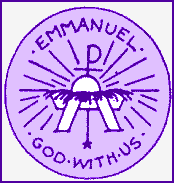 We now arrive at the seventh and final O Antiphon, including related Scriptures, Latin text and English translation, a Latin hymn stanza, and the English versification from the hymn known as O Come, O Come, Emmanuel. (The English language renditions are from the Lutheran Service Book.)
We now arrive at the seventh and final O Antiphon, including related Scriptures, Latin text and English translation, a Latin hymn stanza, and the English versification from the hymn known as O Come, O Come, Emmanuel. (The English language renditions are from the Lutheran Service Book.)℣ O Emmanuel, Rex et legisfer noster, expectatio gentium, et Salvator erum:
℟ veni ad salvandum nos, Domine Deus noster.
℣ O Emmanuel, our King and our Lord, the Anointed for the nations and their | Savior:*
℟ Come and save us, O | Lord our God.
"Therefore the Lord himself will give you a sign. Behold, the virgin shall conceive and bear a son, and shall call his name Immanuel. (Isaiah 7:14)" See also Isaiah 8:6-8; Matthew 1:23; Haggai 2:7 (KJV).
Veni Veni, Emmanuel Captivum solve Israel,
Qui gemit in exsilio, Privatus Dei Filio.
O come, O come, Emmanuel, And ransom captive Israel,
That mourns in lonely exile here Until the Son of God appear.
Rejoice! Rejoice! Emmanuel Shall come to thee, O Israel!
Read the final daily meditation from the O Antiphons by Pastor Weedon.
Ero Cras!
Unless otherwise noted, Scriptures are quoted from the ESV®
Labels: advent, christmas, emmanuel, god with us, hymnody, immanuel, liturgics, magnificat, o antiphons, ransom, vespers, worship
22 December
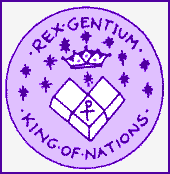 This brings us to the sixth O Antiphon. Again, we have the Latin text and English translation, a Latin hymn stanza, and the English versification from the hymn known as O Come, O Come, Emmanuel are included. (The English language renditions are from the Lutheran Service Book.)
This brings us to the sixth O Antiphon. Again, we have the Latin text and English translation, a Latin hymn stanza, and the English versification from the hymn known as O Come, O Come, Emmanuel are included. (The English language renditions are from the Lutheran Service Book.)℣ O Rex gentium, et desideratus earum, lapisque angularis, qui facis utraque unem:
℟ veni, et salva hominem, quem de limo formasti.
℣ O King of the Nations, the Ruler they long for, the Cornerstone uniting all | people:*
℟ Come and save us all, whom You formed | out of clay.
"For to us a child is born, to us a son is given; and the government shall be upon his shoulder, and his name shall be called Wonderful Counselor, Mighty God, Everlasting Father, Prince of Peace. (Isaiah 9:6)" Also, "He shall judge between the nations, and shall decide disputes for many peoples; and they shall beat their swords into plowshares, and their spears into pruning hooks; nation shall not lift up sword against nation, neither shall they learn war anymore. (Isaiah 2:4)." See also Revelation 15:3; Psalm 118:22; Isaiah 28:16; Matthew 21:42; Mark 12:10; Luke 20:17; Acts 4:11; Ephesians 2:19-21; 1 Peter 2:6.
Veni, Veni, Rex Gentium, Veni, Redemptor omnium,
Ut salvas tuos famulos Peccati sibi conscios.
Oh, come, Desire of nations, bind In one the hearts of all mankind;
Bid Thou our sad divisions cease, And be Thyself our King of Peace.
Rejoice! Rejoice! Emmanuel Shall come to thee, O Israel!
Read today's comments on O Rex Gentium from William Weedon.
Scripture quoted from the ESV®
Labels: advent, christmas, desire, emmanuel, gentiles, hymnody, immanuel, king, liturgics, magnificat, o antiphons, rex gentium, vespers, worship
21 December
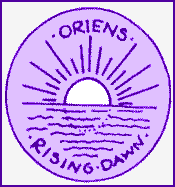 Here follows the fifth of the seven O Antiphons, with Latin text and English translation, a Latin hymn stanza, and the English versification from the hymn known as O Come, O Come, Emmanuel. (The English language renditions are from the Lutheran Service Book.)
Here follows the fifth of the seven O Antiphons, with Latin text and English translation, a Latin hymn stanza, and the English versification from the hymn known as O Come, O Come, Emmanuel. (The English language renditions are from the Lutheran Service Book.)℣ O Oriens, splendor lucis aeternae, et sol justitiae:
℟ veni, et illumina sedentis in tenebris, et umbra mortis.
℣ O Dayspring, splendor of light ever- | lasting:*
℟ Come and enlighten those who sit in darkness and in the sha- | dow of death.
"The people who walked in darkness have seen a great light; those who dwelt in a land of deep darkness, on them has light shined. (Isaiah 9:2)" See also Luke 1:78-79; Malachi 4:2.
Veni, Veni O Oriens, Solare nos adveniens,
Noctis depelle nebulas, Dirasque mortis tenebras.
O come, Thou Dayspring from on high, And cheer us by Thy drawing nigh,
Disperse the gloomy clouds of night, And death's dark shadows put to flight.
Rejoice! Rejoice! Emmanuel Shall come to thee, O Israel!
Continue by reading this from Pr. William Weedon
Scripture quoted from the ESV®
Labels: advent, christmas, dayspring, emmanuel, hymnody, immanuel, liturgics, magnificat, o antiphons, oriens, vespers, worship
The Apostle Thomas (Hebrew or Aramaic for "twin") was also called Didymus (Greek for "twin"); either his parents gave him a most peculiar name or else he consistently went by his nickname.
 Absent when the Risen Lord appeared to the other apostles on the evening of Easter Day, He refused to believe that Christ had indeed risen until he had seen Him for himself. When he saw Him the following week, he said to Jesus, "My Lord and My God."
Absent when the Risen Lord appeared to the other apostles on the evening of Easter Day, He refused to believe that Christ had indeed risen until he had seen Him for himself. When he saw Him the following week, he said to Jesus, "My Lord and My God."Because of this, he has been known ever since as "Doubting Thomas," although "Disbelieving Thomas" or even "Faithless Thomas" probably would be more accurate. See John 20:19-29 for the full account.
We also remember his earlier words, when Jesus announced His intention of going to Jerusalem, even though His life was in danger there: Thomas said to the others, "Let us also go, that we may die with him." (John 11:7-16) Thus, we see that Thomas was sturdily loyal.
At the Last Supper, Jesus said: "In my Father's house are many rooms. If it were not so, would I have told you that I go to prepare a place for you? And if I go and prepare a place for you, I will come again and will take you to myself, that where I am you may be also. And you know the way to where I am going." Thomas was the one who responded, "Lord, we do not know where you are going. How can we know the way?" To this Jesus answered: "I am the way, and the truth, and the life. No one comes to the Father except through me. (see John 14:1-6)"
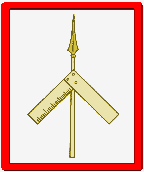 John 21 records Thomas as one of the seven disciples fishing on the Sea of Galilee when the Lord appeared to them. Aside from these Biblical accounts, he appears only as a name on lists of the Apostles.
John 21 records Thomas as one of the seven disciples fishing on the Sea of Galilee when the Lord appeared to them. Aside from these Biblical accounts, he appears only as a name on lists of the Apostles.A few centuries later, a story circulated in the Mediterranean world that he went to preach in India; a community in the Kerala district claims descent from Christians converted by the preaching of Thomas. Among Indian Christians, tradition claims that Thomas was speared to death near Madras, and accordingly is often pictured holding a spear.
Since he was credited with the building up of the Church through his missionary journeys, a carpenter's square also is a regular symbol of the apostle.
Lection
Psalm 136:1-4
Judges 6:36-40
Ephesians 4:7, 11-16
John 20:24-29
Collect
Almighty and ever living God, who upheld and strengthened Your apostle Thomas with sure and certain faith in Your Son's resurrection, grant us perfect and unwavering belief in Jesus Christ, our resurrected Lord and God, that our faith may never be found wanting in Your sight; through this same Jesus Christ, who lives and reigns with You and the Holy Spirit, one God, now and forever.
Labels: apostle, biography, christ, disciple, doubting thomas, feasts, festivals, gospels, hagiography, jesus, martyrdom, new testament, resurrection, saint thomas, thomas
20 December
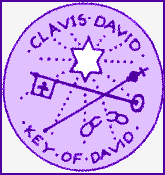 This is the fourth of the seven O Antiphons with Scriptures, Latin and English texts of the antiphon, a Latin hymn stanza, and the English versification from the hymn we know as O Come, O Come, Emmanuel. (The English language renditions are from the Lutheran Service Book.)
This is the fourth of the seven O Antiphons with Scriptures, Latin and English texts of the antiphon, a Latin hymn stanza, and the English versification from the hymn we know as O Come, O Come, Emmanuel. (The English language renditions are from the Lutheran Service Book.)℣ O Clavis David, et sceptrum domus Israel: qui aperis, et nemo claudit; claudis, et nemo aperit:
℟ veni et educ vinctum de domo carceris, sedentem in tenebris, et umbra mortis.
℣ O Key of David, and Scepter of the House of Israel, You open and no one can close, You close and no one can | open:*
℟ Come and rescue the prisoners who are in darkness and the shad- | ow of death.
"I will place on his shoulder the key of the house of David. He shall open, and none shall shut; and he shall shut, and none shall open. (Isaiah 22:22)" "Of the increase of his government and of peace there will be no end, on the throne of David and over his kingdom, to establish it and to uphold it with justice and with righteousness from this time forth and forevermore. The zeal of the Lord of hosts will do this. (Isaiah 9:7)" See also Revelation 3:7.
Veni, Clavis Davidica, regna reclude caelica,
fac iter tutum superum, et claude vias inferum.
O come, Thou Key of David, come, And open wide our heav'nly home;
Make safe the way that leads on high, And close the path to misery.
Rejoice! Rejoice! Emmanuel Shall come to you, O Israel!
Here's more from Pastor Weedon.
Scripture quoted from the ESV®
Labels: advent, christmas, clavis david, david, emmanuel, hymnody, immanuel, key of david, liturgics, magnificat, o antiphons, vespers, worship
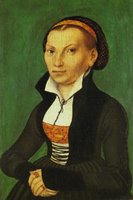 Financial and marital circumstances led Katharina von Bora's (b.1499) parents to place her in a convent when she was but a child of five. In 1515, she became a nun. Later, she and some of her associates heard clear proclamation of Gospel through the Lutheran Reformation. This Gospel message soon changed their beliefs and their lives.
Financial and marital circumstances led Katharina von Bora's (b.1499) parents to place her in a convent when she was but a child of five. In 1515, she became a nun. Later, she and some of her associates heard clear proclamation of Gospel through the Lutheran Reformation. This Gospel message soon changed their beliefs and their lives.Convinced that the vows they had taken were contrary to God's word, Katharina joined eight other nuns who desired to renounce the cloistered life. In April 1523 they were rescued from the convent and smuggled away to Wittenberg among empty herring barrels. Martin Luther and his associates helped some of these women return to their former homes while placing others with good families. Most of them were soon married.
However, Luther and friends found that dealing with "Katie" was no easy task. She rejected a number of prospective husbands, finally declaring that she'd marry either Martin or Nikolaus von Amsdorf — and nobody else. While he worried that a violent death would soon part him from any bride, Martin gave in to the stubborn young woman. They were married on 13 June 1525. Their happy marriage was blessed with six children. Katie skillfully managed the Luther household, which seemed to grow ever larger because of his generous hospitality.
 Martin and Katie certainly butted heads at times. Perhaps that's why Luther sometimes called her kette (chain). However, the reformer truly adored his bride, also naming her "my Rib" and "my lord Katie." The freedom and joy that he experienced in his marriage received testimony from his 1535 Commentary on Galatians, which Luther lovingly called, "My Katie von Bora."
Martin and Katie certainly butted heads at times. Perhaps that's why Luther sometimes called her kette (chain). However, the reformer truly adored his bride, also naming her "my Rib" and "my lord Katie." The freedom and joy that he experienced in his marriage received testimony from his 1535 Commentary on Galatians, which Luther lovingly called, "My Katie von Bora."After Martin's death in 1546, Katie remained in Wittenberg. Sadly, she lived most of her remaining years in poverty. Her 1552 death came after an accident she suffered while traveling with her children to Torgau in order to escape the plague.
Katharina Luther remains a wonderful example of godly womanhood, beautifully portraying the "excellent wife" celebrated in Proverbs 31:10-31.
For more on Katie Luther, visit the online exhibit at Concordia Historical Institute. These portraits of Martin and Katharina Luther were painted by Lucas Cranach the Elder during the first year of their marriage. The originals are in the Wartburg Collection in Eisenach.
Lection
Psalm 128
Proverbs 31:10-31 or 31:10-12, 17, 20, 23, 25-31
1 Corinthians 7:1-9
John 3:25-30
Collect
Dear heavenly Father, You establish marriage to bless and benefit all mankind and to testify to the world of the marriage of Christ and His Bride the Church. Grant that, as You led Katharina von Bora to become the wife of Martin Luther and, through her, blessed not only him but all Christendom, so You would also seal and protect marriages in our day, that families, society, and Church would be strengthened, stabilized, and nurtured until You call us to the wedding feast of the Lamb in His kingdom, which has no end; through this same Bridegroom, our Lord Jesus Christ, who lives and reigns with You and the Holy Spirit, one God, now and forever.
Hymn Stanza
A world that disregarded The gift of married life
Saw God call saintly Katie As Martin’s faithful wife.
Her self she gave completely To him, who loved his Rib;
Submission, strength, and courage, Her testaments, still live.
Commemorative hymn stanza from Ask the Pastor is © 2006 by Walter P. Snyder and used according to permission granted.
Labels: biography, church history, commemoration, hagiography, katharina luther, katie luther, marriage, martin luther, reformation, von bora
19 December
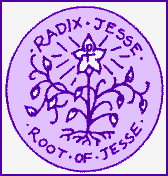 Here follows the third of the O Antiphons with Scriptures, Latin and English texts of the antiphon, a Latin hymn stanza, and the English versification from the hymn we know as O Come, O Come, Emmanuel. (The English language renditions are from the Lutheran Service Book.)
Here follows the third of the O Antiphons with Scriptures, Latin and English texts of the antiphon, a Latin hymn stanza, and the English versification from the hymn we know as O Come, O Come, Emmanuel. (The English language renditions are from the Lutheran Service Book.)℣ O Radix Jesse, qui stas in signum populorum, super quem continebunt reges os suum, quem gentes deprecabuntur;
℟ veni ad liberandum nos, iam noli tardere.
℣ O Root of Jesse, standing as an ensign before the peoples, before whom all kings are mute, to whom they will do | homage:*
℟ Come quickly to de- | liver us.
"There shall come forth a shoot from the stump of Jesse, and a branch from his roots shall bear fruit. (Isaiah 11:1)" "In that day the root of Jesse, who shall stand as a signal for the peoples — of him shall the nations inquire, and his resting place shall be glorious. (Isaiah 11:10)" Jesse was the father of King David; Micah prophesied that the Messiah would be of the house and lineage of David and be born in David's city, Bethlehem (Micah 5:2). See also Romans 15:12; Revelation 5:5.
Veni, O Jesse Virgula, Ex hostis tuos ungula,
De spectu tuos tartari Educ et antro barathri.
O come, Thou Branch of Jesse's tree, Free them from Satan's tyranny
That trust Thy mighty pow'r to save, And give them vict'ry o'er the grave.
Rejoice! Rejoice! Emmanuel Shall come to you, O Israel!
Please see also what Pastor Weedon wrote.
Scripture quoted from the ESV®
Labels: advent, christmas, emmanuel, hymnody, immanuel, jesse, liturgics, magnificat, o antiphons, radix, root, vespers, worship
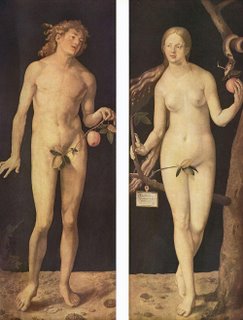 Adam was the first man, made in the image of God and given dominion over all the earth (Genesis 1:26). His name may be variously translated "earth," "dust," or "clay," all of which point to the substance of his making. [A brief digression: Adam may also mean "red." This is akin to "Edom," the later name for Esau, who received the title not only because of how he looked at birth (25:25) but also because he sold his birthright for the red stew (25:29-34).]
Adam was the first man, made in the image of God and given dominion over all the earth (Genesis 1:26). His name may be variously translated "earth," "dust," or "clay," all of which point to the substance of his making. [A brief digression: Adam may also mean "red." This is akin to "Edom," the later name for Esau, who received the title not only because of how he looked at birth (25:25) but also because he sold his birthright for the red stew (25:29-34).]Eve was the first woman, formed from one of Adam's ribs (may also be understood as from his side)to be his companion and helper (2:18-24). Her name seems related to the Hebrew words for "life giver" and "living." Interestingly, however, Adam didn't give her this name until after the Fall.
God placed Adam and Eve in the Garden of Eden to take care of the creation as His stewards, or representatives. But they forsook God's Word, ate the fruit of the one tree of which the Lord had placed off-limits to them, and plunged the world into sin (3:1-7). For this disobedience, God drove them from the Garden. Eve had to suffer the pain of childbirth and be subject to Adam; Adam had to toil amid thorns and thistles and return to the dust of the ground. Our burial rite recalls this curse, as does the traditional sentence pronounced during Ash Wednesday's imposition of ashes: "Remember that you are dust, and to dust you shall return. (LSB Altar Book)"
 Despite Adam and Eve's attempt to overthrow their Creator and make themselves into gods, the Lord promised that the woman's Seed would crush the serpent's head while Himself suffering a mortal wound (3:8–24). While sin had entered God's perfect creation, decaying and changing it, God would restore it again through the perfect life and the bitter suffering and death of His beloved Son, the God-man Jesus Christ. And even though He died in the struggle, He rose to life on the Third Day and lives forevermore, as seal that we, too will rise and live in God's presence forever.
Despite Adam and Eve's attempt to overthrow their Creator and make themselves into gods, the Lord promised that the woman's Seed would crush the serpent's head while Himself suffering a mortal wound (3:8–24). While sin had entered God's perfect creation, decaying and changing it, God would restore it again through the perfect life and the bitter suffering and death of His beloved Son, the God-man Jesus Christ. And even though He died in the struggle, He rose to life on the Third Day and lives forevermore, as seal that we, too will rise and live in God's presence forever.Eve is the mother of the human race. Adam not only fathered all mankind but also represents all humanity and the Fall, as St. Paul writes, "For in Adam all die, so also in Christ shall all be made alive. (1 Corinthians 15:22)" The sinful corruption and rebellious natures which we have from conception and birth we sometimes call original (or "birth") sin. It clings to all descendants of Adam, save Jesus. Therefore, we often speak of our sinful natures as the Old Adam.
This date for the commemoration was chosen by the The Lutheran Church — Missouri Synod. For some of my personal observations on the First and Second Adams, I invite you to read Temptation: Adam and Adamant. Drawing on this account, Pastor Michael McCoy wrote an extended allegory of the Church and the Pastoral Office, beginning in the Garden and ending with the Final Judgment. The Bestman, the Bride, and the Wedding is available for purchase as a paperback or as a free download (1.66mb PDF). Pastor McCoy also provides a detailed study guide.
Labels: adam, biography, christology, commemoration, creation, eve, fall, gospel, hagiography, law, serpent
18 December
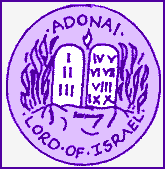 This is the second of the O Antiphons with Scriptures, Latin and English texts of the antiphon, a Latin hymn stanza, and the English versification from the hymn we know as O Come, O Come, Emmanuel. (The English language renditions are from the Lutheran Service Book.)
This is the second of the O Antiphons with Scriptures, Latin and English texts of the antiphon, a Latin hymn stanza, and the English versification from the hymn we know as O Come, O Come, Emmanuel. (The English language renditions are from the Lutheran Service Book.)"With righteousness he shall judge the poor, and decide with equity for the meek of the earth; and he shall strike the earth with the rod of his mouth, and with the breath of his lips he shall kill the wicked. Righteousness shall be the belt of his waist, and faithfulness the belt of his loins. (Isaiah 11:4-5)" "For the Lord is our judge; the Lord is our lawgiver; the Lord is our king; he will save us. (Isaiah 33:22)" See also Exodus 3; Micah 5:2; Matthew 2:6.
℣ O Adonai, et dux domus Israel, qui Moysi in igne flammae rubi apparuisti, et ei in Sina legem dedisti:
℟ veni ad redimendum nos in brachio extento.
℣ O Adonai and Ruler of the House of Israel, who appeared to Moses in the burning bush and gave him the Law on | Sinai:*
℟ come with an outstretched arm and re- | deem us.
Veni, Veni, Adonai, Qui populo in Sinai
Legem dedisti vertice In maiestate gloriae.
O come, O come, Thou Lord of might, Who to Thy tribes on Sinai's height
In ancient times didst give the Law In cloud and majesty and awe.
Rejoice! Rejoice! Emmanuel Shall come to thee, O Israel!
Read some more from William Weedon.
Scripture quoted from the ESV®
Labels: adonai, advent, christmas, emmanuel, hymnody, immanuel, liturgics, lord, magnificat, o antiphons, vespers, worship
17 December
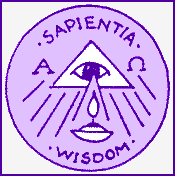 This is the first of the O Antiphons with relevant Scriptures, Latin and English texts, the corresponding Latin hymn stanza, and the English versification from the hymn O Come, O Come, Emmanuel. (The English language renditions are from the Lutheran Service Book.)
This is the first of the O Antiphons with relevant Scriptures, Latin and English texts, the corresponding Latin hymn stanza, and the English versification from the hymn O Come, O Come, Emmanuel. (The English language renditions are from the Lutheran Service Book.)℣ O Sapientia, quae ex ore Altissimi prodiisti, attingens a fine usque ad finem fortiter, suaviterque disponens omnia:
℟ veni ad docendum nos viam prudentiae.
℣ O Wisdom, proceeding from the mouth of the Most High, permeating all creation, mightily ordering | all things:*
℟ Come and teach us the way of | prudence.
"And the Spirit of the Lord shall rest upon him, the Spirit of wisdom and understanding, the Spirit of counsel and might, the Spirit of knowledge and the fear of the Lord. And his delight shall be in the fear of the Lord. (Isaiah 11:2-3)" "This also comes from the Lord of hosts; he is wonderful in counsel and excellent in wisdom. (Isaiah 28:29)" See also Proverbs 1:20; Proverbs 8-9 and 1 Corinthians 1:30.
Veni, O Sapientia, Quae hic disponis omnia,
Veni, viam prudentiae Ut doceas et gloriae.
O come, Thou Wisdom from on high, Who ord'rest all things mightily;
To us the path of knowledge show, And teach us in her ways to go.
Rejoice! Rejoice! Emmanuel Shall come to thee, O Israel!
You are invited to read more from Pastor Weedon. Also, I'm hoping to gain access to the audio of these antiphons as chanted by Kantor Nathan Beede.
Scripture quoted from the ESV®
Labels: advent, christmas, emmanuel, hymnody, immanuel, liturgics, magnificat, o antiphons, sapientia, vespers, wisdom, worship
Today we commemorate the Holy Prophet Daniel and the Three Young Men — Shadrach, Meshach, and Abednego. These four were among the young men of Judah who were taken into captivity in Babylon. Showing promise in leadership positions, their captors elevated them to positions or authority. Still, even in that strange and foreign land, regardless of persecution or pressure to worship false gods, they remained faithful to the one true God in piety, prayer, and life.
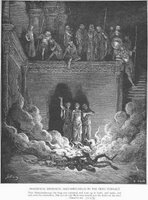 On account of their steadfast faithfulness in the face of pagan idolatry, the Three Young Men were thrown into a fiery furnace, from which they were saved by the Lord and emerged unharmed (Daniel 3). Similarly, Daniel was thrown into a pit of lions, from which he also was saved (Daniel 6).
On account of their steadfast faithfulness in the face of pagan idolatry, the Three Young Men were thrown into a fiery furnace, from which they were saved by the Lord and emerged unharmed (Daniel 3). Similarly, Daniel was thrown into a pit of lions, from which he also was saved (Daniel 6).The canonical text of Daniel only tells us that a fourth person joined the Three Young Men in the furnace and that they were unharmed in the ordeal. Supplemental accounts from the Apocrypha provide insertions between verses 23 and 24 of chapter 3. The Prayer of Azariah and The Song of the Three Young Men are purported accounts of what they sang and prayed while amidst the flames. The latter song entered Jewish and then Christian worship as a canticle of praise. Much of Christendom knows the song by its Latin title and still sings Benedicite Omnia Opera (Bless Him, All You Works [of the Lord]). These verses also inspire hymnists and various metrical works based upon the Benedicite have been written and sung through the years.
Perhaps because of its apocalyptic nature, the book of Daniel inspired not only these two prayers but other "supplemental" writings. Some Bibles insert these various passages into the Masoretic Text while others include some or all of them as separate writings. Of these additions, the two most noted are Susanna and Bel and the Dragon. The former is a tale of moral integrity in the face of sexual blackmail while the latter is a loose collection of stories involving Babylonian gods, a literal beast slain by Daniel, and a different tale of the prophet amidst the lions.
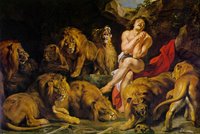 Blessed in all their endeavors by the Lord — and in spite of the hostility of some — Daniel and the Three Young Men performed admirably in the positions of leadership granted to them (Daniel 2:48-49; 3:30; 6:28). No doubt their fidelity in their vocations brought more animosity from others than did their faith and worship.
Blessed in all their endeavors by the Lord — and in spite of the hostility of some — Daniel and the Three Young Men performed admirably in the positions of leadership granted to them (Daniel 2:48-49; 3:30; 6:28). No doubt their fidelity in their vocations brought more animosity from others than did their faith and worship.Daniel received special favor from the Lord and was given the ability to interpret the difficult dreams and strange signs that were given to King Nebuchadnezzar and King Belshazzar (Daniel 2; 4-5). To Daniel himself the Lord gave visions of the end times and a picture of "one like a son of man" who "came to the Ancient of Days. (Daniel 7:9-14)" This same imagery returns to Holy Scripture in portions of Revelation and was also a title Jesus favored for Himself, as Saint Matthew frequently noted.
As an aside, we note that the Babylonians gave new names to some of their captives. Although the book and most references to the prophet use his Hebrew name, Daniel was also known as Belteshazzar. Meanwhile, the Three Young Men are normally referred to by their captive names of Shadrach, Meshach, and Abednego. Their Hebrew names were, respectively, Hananiah, Mishael, and Azariah.
Labels: abednego, biography, commemoration, daniel, fiery furnace, hagiography, meshach, nebuchadnezzar, old testament, prophet, shadrach
 We count down the final days of Advent using the traditional monastic antiphons to the Magnificat. Most of English speaking Christendom knows these antiphons through their versification, Oh, Come, Oh, Come, Emmanuel. Beginning in eternity, the antiphons follow a rough chronology through history until the coming of Immanuel, Hebrew for "God [is] with Us" (see Isaiah 7:14; Matthew 1:23)
We count down the final days of Advent using the traditional monastic antiphons to the Magnificat. Most of English speaking Christendom knows these antiphons through their versification, Oh, Come, Oh, Come, Emmanuel. Beginning in eternity, the antiphons follow a rough chronology through history until the coming of Immanuel, Hebrew for "God [is] with Us" (see Isaiah 7:14; Matthew 1:23)Thus, the first stanza that we normally sing of the hymn is actually the last of the antiphons, sung on 23 December. By Vespers on the 24th, it's time to remove the final vestiges of Advent and enter into Christmas.
 The order itself, whether by design or coincidence, forms a Latin reverse acrostic. The initial address for the coming Savior in each antiphon is as follows: Sapientia, Adonai, Radix, Clavis, Oriens, Rex, and Emmanuel. Taking each title's first letter and writing the result backwards yields "ero cras"; normally this is rendered, "I shall be [with you] tomorrow." Thus our Lord promises to return for us and so He leads us to pledge to join together in His worship while still on earth.
The order itself, whether by design or coincidence, forms a Latin reverse acrostic. The initial address for the coming Savior in each antiphon is as follows: Sapientia, Adonai, Radix, Clavis, Oriens, Rex, and Emmanuel. Taking each title's first letter and writing the result backwards yields "ero cras"; normally this is rendered, "I shall be [with you] tomorrow." Thus our Lord promises to return for us and so He leads us to pledge to join together in His worship while still on earth.Through the next week, I'll post each day's antiphon in Latin, its translation from Lutheran Service Book, the Latin hymn verse, and the corresponding hymn stanza of O Come, O Come, Emmanuel from LSB. If you don't want to wait for each day's antiphon, I've linked to each individually from December 2007.
Posts in the Series:
† O Sapientia — O Wisdom
† O Adonai — O Lord and Ruler
† O Radix Jesse — O Root of Jesse
† O Clavis David — O Key of David
† O Oriens — O Dayspring
† O Rex Gentium — O King of the Nations
† O Emmanuel — O God with Us
Labels: advent, christmas, emmanuel, hymnody, immanuel, liturgics, magnificat, o antiphons, vespers, worship
 Lucia (also Lucy or Lukia) was one of the victims of the great persecution under the Roman emperor Diocletian. She met her death at Syracuse on the island of Sicily because of her Christian faith. Known for her charity, "Santa Lucia" (as she is called in Italy) gave away her dowry and remained a virgin until her execution by the sword. Some accounts, similar to those surrounding Saint Polycarp, claim that Lucy was first sentenced to be burned and that when this failed, she was stabbed to death.
Lucia (also Lucy or Lukia) was one of the victims of the great persecution under the Roman emperor Diocletian. She met her death at Syracuse on the island of Sicily because of her Christian faith. Known for her charity, "Santa Lucia" (as she is called in Italy) gave away her dowry and remained a virgin until her execution by the sword. Some accounts, similar to those surrounding Saint Polycarp, claim that Lucy was first sentenced to be burned and that when this failed, she was stabbed to death.Various stories are told about her. Some claim that she refused to marry a pagan and was killed; others say that forfeiting her dowry led her unbelieving fiancé to denounce her to the authorities as a Christian. Another account tells us that either during or at a time before her execution, her eyes were gouged out but that God restored her sight.
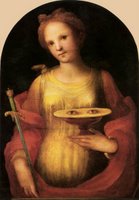 The name Lucia means "light." Because of that, festivals of light held in her honor became popular throughout Europe, especially in the Scandinavian countries. There, her feast day corresponds with the time of year when there is the least amount of daylight. Under the Julian Calendar, her feast day actually fell on the shortest, darkest day of the year but this connection vanished with adoption of the Gregorian Calendar.
The name Lucia means "light." Because of that, festivals of light held in her honor became popular throughout Europe, especially in the Scandinavian countries. There, her feast day corresponds with the time of year when there is the least amount of daylight. Under the Julian Calendar, her feast day actually fell on the shortest, darkest day of the year but this connection vanished with adoption of the Gregorian Calendar.Ecclesiastical art often portrays Saint Lucia holding a palm branch, the traditional sign of victory or martyrdom; a sword may also be shown piercing her breast or throat. Sometimes, as in the pictures above, we see her holding her missing eyes in her hand or on a plate before her.
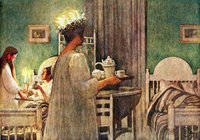 Another common portrayal has the saint dressed in a white baptismal gown, wearing a wreath of candles upon her head. In many Nordic homes, this attire is mimicked on her feast day. One of the girls or women of a household, often the eldest daughter, wakes early on Lucy's feast day, prepares a special breakfast, dons a headpiece of candles, and moves through the home with the meal honoring the saint.
Another common portrayal has the saint dressed in a white baptismal gown, wearing a wreath of candles upon her head. In many Nordic homes, this attire is mimicked on her feast day. One of the girls or women of a household, often the eldest daughter, wakes early on Lucy's feast day, prepares a special breakfast, dons a headpiece of candles, and moves through the home with the meal honoring the saint.Lucy's name was applied to various people and places in the centuries following her death. Among the most noted would be the Santa Lucia area of Naples, celebrated in the Neapolitan song Santa Lucia. The tune calls Lucy's namesake area impero dell'armonia (the empire of harmony).
Agatha, 5 February AD 290
With Lucy, the Church sometimes also honors the virgin martyr Agatha. She came from Catania in Sicily, and was most likely martyred in the late 200s. Aside from her name on the lists of early martyrs, we know nothing of her.
Lection
Psalm 65:1-8
Deuteronomy 33:1-3
Revelation 7:2-17
Matthew 5:1-12
Collect
O Almighty God, by whose grace and power Your holy martyr(s) Lucy (and Agatha) triumphed over suffering and was (were) faithful even unto death, grant us, who now remember her (them) with thanksgiving, to be so faithful in our witness to You in this world, that we may receive with her (them) the crown of life; through Jesus Christ our Lord, who lives and reigns with You and the Holy Spirit, one God, forever and ever.
Hymn Stanza
For holy martyr Lucy, Who faced the tyrant's sword
And through her death gave witness, We praise Your name, O Lord.
Your light she showed in darkness; May we thus also shine
Until, our struggles ended, We see Your face divine.
Hymn text © 2006 by Walter P. Snyder. Permission granted for use with proper attestation.
Labels: agatha, biography, church history, commemoration, diocletian, european history, italian history, light, lucia, lucy hagiography, martyrdom, roman empire, scandanavia
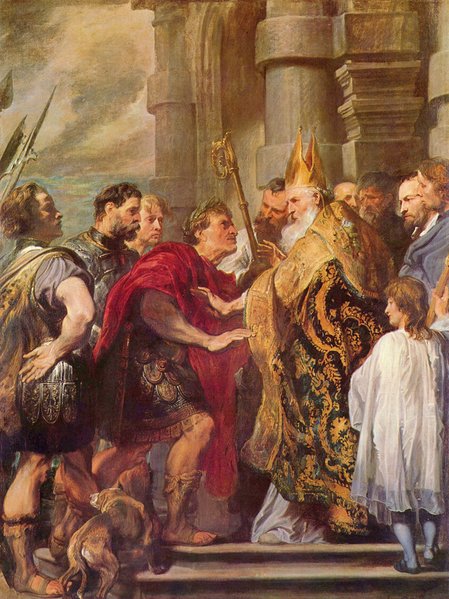 Saint Ambrose of Milan was born in Trier around AD 340. He became a Roman governor in northern Italy and the people of Milan later named him bishop by general acclaim. He stands as one of the four Latins among the eight Doctors of the undivided Church. Augustine, Jerome, and Gregory the Great are the West's other representatives; Athanasius, John Chrysostom, Basil the Great, and Gregory of Nazianzus represent the East.
Saint Ambrose of Milan was born in Trier around AD 340. He became a Roman governor in northern Italy and the people of Milan later named him bishop by general acclaim. He stands as one of the four Latins among the eight Doctors of the undivided Church. Augustine, Jerome, and Gregory the Great are the West's other representatives; Athanasius, John Chrysostom, Basil the Great, and Gregory of Nazianzus represent the East.Ambrose was also an author of hymns, the best known of which is probably Intende, qui regis Israel (usually known by its second stanza as Veni, Redemptor gentium). Martin Luther translated it into German (Nun komm, der Heiden Heiland); its English translations (from Luther or the original Latin) usually appear as Savior of the Nations, Come; Savior of the Heathen, Known; or Come, Thou Redeemer of the Earth).
His name is also associated with Ambrosian Chant. You can search the web for examples of the notation while YouTube has a number of recordings of sacred music performed according to Ambrosian sensibilities. This style of chanting the ancient liturgy took hold in the province of Milan. For more on his musical influence in the Church, see the NetHymnal for a detailed list with links to translations and adaptations of a number of the Hymns of Saint Ambrose.
While serving as a civil governor, Ambrose sought to bring peace among Christians in Milan who were divided into quarreling factions. When a new bishop was to be elected in 374, Ambrose addressed the crowd, and someone cried out, "Ambrose, bishop!" The entire gathering gave their support. At this time, Ambrose was still a catechumen, an unbaptized person still under instruction before joining the church. The general acclaim hastened the catechetical process and the 34-year-old was baptized on December 7, after which he was consecrated bishop of Milan.
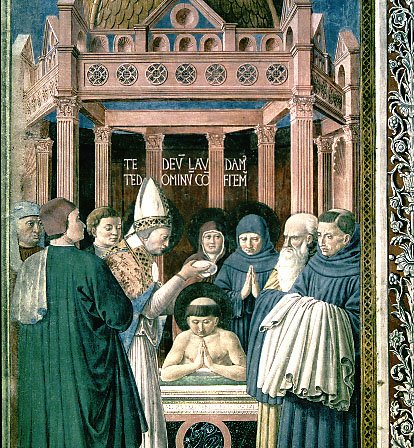 A strong defender of the faith, Ambrose convinced the Roman emperor Gratian in 379 to forbid the Arian heresy in the West. At Ambrose's urging, Gratian's successor Theodosius also publicly opposed Arianism.
A strong defender of the faith, Ambrose convinced the Roman emperor Gratian in 379 to forbid the Arian heresy in the West. At Ambrose's urging, Gratian's successor Theodosius also publicly opposed Arianism.Ambrose died on Good Friday, 4 April 397, but the Church was unwilling to honor such a known and popular person on the day commemorating the death of Christ. Thus, his feast day was transferred from his "heavenly birthday" (or death date) to the date of his baptism and subsequent consecration as bishop.
Ambrose was also instrumental in the conversion of Augustine of Hippo. Some early traditions hold that the hymn Te Deum Laudamus ("We Praise You, O God") was a spontaneous composition by Ambrose, perhaps with Augustine's help, upon the baptism of the latter. While later researchers hold this to be unlikely, some scholars are convinced that he was largely responsible for authorship of the Athanasian Creed (14k PDF).
As a courageous doctor and musician he upheld the truth of God's Word. Once again this Advent-tide, thousands upon thousands of believers will use Savior of the Nations, Come to pray for the Second Coming of our Lord. Here is my favorite, passed on to us from Ambrose via Martin Luther and William Morton Reynolds:
Savior of the nations, come;
Virgin's Son, here make Thy home!
Marvel now, O heaven and earth,
That the Lord chose such a birth.
Not by human flesh and blood;
By the Spirit of our God
Was the Word of God made flesh,
Woman's offspring, pure and fresh.
Wondrous birth! O wondrous Child
Of the virgin undefiled!
Though by all the world disowned,
Still to be in heaven enthroned.
From the Father forth He came
And returneth to the same,
Captive leading death and hell
High the song of triumph swell!
Thou, the Father's only Son,
Hast over sin the victory won.
Boundless shall Thy kingdom be;
When shall we its glories see?
Brightly doth Thy manger shine,
Glorious is its light divine.
Let not sin o'ercloud this light;
Ever be our faith thus bright.
Praise to God the Father sing,
Praise to God the Son, our King,
Praise to God the Spirit be
Ever and eternally.
Lection
Psalm 27:5-11 or 33:1-5,20-21
Ecclesiasticus 2:7-11,16-18
1 Peter 1:3-9, 13-21
Luke 12:35-37, 42-44
Collect
O God, who graciously gave Your servant Ambrose eloquence to proclaim Your righteousness and fearlessness to bear reproach for the honor of Your Name, mercifully grant to all pastors and overseers such excellence in preaching and faithfulness in ministering Your Word that Your people may be partakers with them of the glory that shall be revealed; through Jesus Christ our Lord, who lives and reigns with You and the Holy Spirit, one God, now and forever.
Labels: ambrose, arianism, augustine, biography, chant, commemoration, european history, hagiography, hymnody, liturgics, music, roman empire, te deum, theology
 Of the many saints recognized by the Christian Church, Nicholas is one of the most widely commemorated. However, very little is known historically of him, although there was a church of Saint Nicholas in Constantinople as early as the sixth century. Research affirms that there was a bishop by the name of Nicholas in the city of Myra in Lycia (part of Turkey today) in the fourth century.
Of the many saints recognized by the Christian Church, Nicholas is one of the most widely commemorated. However, very little is known historically of him, although there was a church of Saint Nicholas in Constantinople as early as the sixth century. Research affirms that there was a bishop by the name of Nicholas in the city of Myra in Lycia (part of Turkey today) in the fourth century.While we don't know a tremendous amount about him, scholars are certain that he was not a "jolly old elf" and that he espoused an austere lifestyle incompatible with "a round little belly" shaking "like a bowl full of jelly."
From that coastal location, legends about Nicholas have traveled across time and distance. He is associated with charitable giving in many countries around the world and is portrayed as the rescuer of sailors, the protector of children, and the friend of people in distress or need. In commemoration of Sinterklaas (a Dutch version of Saint Nicholas), 6 December is a day for giving and receiving gifts in many parts of Europe.
 See the article at Ask the Pastor for a famous apocryphal story and related information on his patronage and "transformation" into the American Santa Claus. There you'll learn about his connection with money lending and his status as patron saint for pawnbrokers.
See the article at Ask the Pastor for a famous apocryphal story and related information on his patronage and "transformation" into the American Santa Claus. There you'll learn about his connection with money lending and his status as patron saint for pawnbrokers.Also, Ask the Pastor includes the following St. Nicholas Day hymn stanza as part of a previous year's article on midweek Advent services based upon sanctorial commemorations in the Christian calendar:
With joy Your Church remembers
Saint Nicholas, the blest,
Who gave up earthly treasures
And Jesus' name confessed.
The poor and weak he welcomed,
The heretic he scorned;
Through faith and life and preaching,
Christ's Gospel he adorned.
Meanwhile, Pastor Alex Klages focused on Nicholas as a staunchly orthodox bishop who grew so weary of the arch-heretic of Nicaea that he slapped Arius for continually professing false doctrine concerning the Lord Jesus Christ.
Lection
Psalm 78:3-7 or 145:8-13
Isaiah 58:6-10
1 John 4:7-14
Mark 10:13-16
Collect
O Lord, let Your continual mercy enkindle in Your Church the unfailing gifts of charity and faith, that, following the example of your servant Nicholas of Myra, we may have grace to deal in generosity and love with children and with all who are poor and distressed, to uphold the cause of those who have no helper, and to strive for purity of doctrine in the Church; for the sake of Him who gave His life for us, Your Son our Savior Jesus Christ, who lives and reigns with You and the Holy Spirit, one God, now and forever.
Labels: arius, biography, church history, commemoration, hagiography, nicholas of myra, patristics, saint nicholas, santa claus, sinterklaas, theology, turkish history
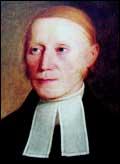 The early Church entrusted some women, particularly widows, with helping to carry out the "social work" of the Church, particularly caring for the sick and needy of the congregation. From reading 1 Timothy 5:1-16, it appears that certain of these women were specially consecrated and made a lifetime commitment to works of mercy. The idea of a female deaconate or service order largely died out by the 7th Century AD, although some groups of nuns and a few informally organized groups undertook similar work.
The early Church entrusted some women, particularly widows, with helping to carry out the "social work" of the Church, particularly caring for the sick and needy of the congregation. From reading 1 Timothy 5:1-16, it appears that certain of these women were specially consecrated and made a lifetime commitment to works of mercy. The idea of a female deaconate or service order largely died out by the 7th Century AD, although some groups of nuns and a few informally organized groups undertook similar work.The modern deaconess movement came mainly through the work of Theodor Fliedner, a German Lutheran. Born in Eppstein, Germany, in 1800, he became pastor of a small parish in Kaiserswerth in 1821 or 1822. Fliedner took the work of England's Elizabeth Fry and Dutch Mennonites as inspiration. Encountering Moravian deaconesses, he also drew from their example.
He began serving the Düsseldorf Prison, walking to and from Düsseldorf on alternating Sundays until the appointment of a regular prison chaplain. This led to more prisons engaging chaplains and establishing regular worship and aid services for the prisoners. He envisioned and opened a nursery school; eventually it became a sort of teachers' college and a starting point for what would become his first deaconess school.
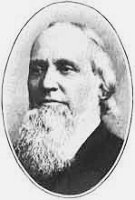 Becoming more involved in Christian social work among the disadvantaged, Fliedner convinced himself that he should revive the order of deaconesses. He opened a hospital and deaconess training center in Kaiserswerth on 13 October 1836. Florence Nightingale heard of his reputation, visited the school in the 1840s, came back to study nursing, and graduated in 1851.
Becoming more involved in Christian social work among the disadvantaged, Fliedner convinced himself that he should revive the order of deaconesses. He opened a hospital and deaconess training center in Kaiserswerth on 13 October 1836. Florence Nightingale heard of his reputation, visited the school in the 1840s, came back to study nursing, and graduated in 1851.The program was so successful that he could send deaconesses to other hospitals by 1838. New deaconess motherhouses grew up in Pittsburgh, Pennsylvania and in Jerusalem, Paris, Berlin, and Strasbourg, and elsewhere. When he died, 30 motherhouses already stood and over 1500 deaconesses served around the world. The middle of the 20th century saw more than 35,000 deaconesses serving world-wide.
Lutherans in the United States may also want to remember William Passavant, who pioneered the American deaconess movement in 1849. He also founded missions, hospitals, orphanages, and schools. Passavant died 3 January 1894.
Additional information available from Wikipedia and James Kiefer.
Labels: american history, biography, christianity, church history, commemoration, deaconess, german history, hagiography, lutheranism, theodor fliedner, william passavant

